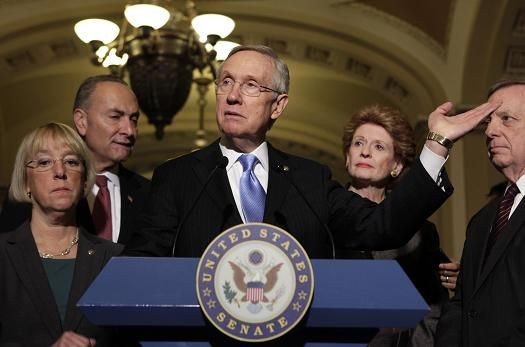Reid Proposes Filibuster Changes, Angering Republicans

Citing endless obstruction from his Republican rivals, Senate Majority Leader Harry Reid is pushing to change the rules governing the filibuster.
But Reid’s latest push to dilute the power of the filibuster, a procedural weapon that is unique to the Senate, ran squarely into the same Republican opposition the Nevada Democrat is trying to curb. Senate Minority Leader Mitch McConnell of Kentucky denounced Reid’s plan on Monday, calling it a “naked power grab.”
“What these Democrats have in mind is a fundamental change to the way the Senate operates for the purpose of consolidating their own power and further marginalizing the minority voices that the Senate was built to protect,” McConnell said in a floor speech.
Reid has been a regular critic of the filibuster, which allows the minority party to stymie legislation by preventing bills from coming to a vote. The modern Senate effectively requires 60 votes to get anything done -- a simple majority of 51 is not enough to invoke what is known as “cloture,” ending debate.
Although Reid noted that the power to filibuster is not enumerated in the Constitution, he insisted that he was keeping the practice largely intact. He said the changes were necessary to break the Senate's analysis, lamenting that Republicans have "made it an almost impossible task to get things done."
The majority leader said he might seek rule changes that would prevent the use of filibusters to prevent debate from starting. He also endorsed forcing lawmakers to remain standing on the Senate floor, talking or reading, in order to let a filibuster proceed.
“The Senate is broken and the only ones that disagree are Republicans and Mitch McConnell,” Reid said. “These plaintive cries that we’re getting rid of the filibuster are lies."
Further angering his Republican counterparts, Reid raised the possibility of instituting the changes by a simple majority vote rather than usual 67 votes needed to alter Senate rules. That carries echoes of 2011, when Reid invoked a rule known as the “nuclear option” to bar the minority party from holding votes on amendments after the Senate has moved to hold a final vote on legislation.
While the word “filibuster” conjures images of lone senators giving extended soliloquies on the Senate floor, Senate Historian Donald Ritchie pointed out that the term encompasses a broad range of disruptive tactics. Far more common than an endless speech (Sen. Bernie Sanders of Vermont was the last one to go this way, in a 2010 effort to oppose an extension of the Bush-era tax cuts) is the sight of senators objecting to the unanimous consent agreements that allow the Senate to move forward on a bill.
“Just what exactly is a filibuster?” Ritchie asked rhetorically. “It’s very amorphous. The bottom line is the rules of the House are designed to allow the majority to act, as long as the majority acts together. The rules of the Senate traditionally give more muscle to the minority, or even to factions within the majority.”
Given that structure, it is likely that McConnell and his allies will fight doggedly against Reid’s proposed changes. If Reid does force through an overhaul via a simple majority vote, he will have affirmed that being in the majority has its advantages.
© Copyright IBTimes 2024. All rights reserved.





















